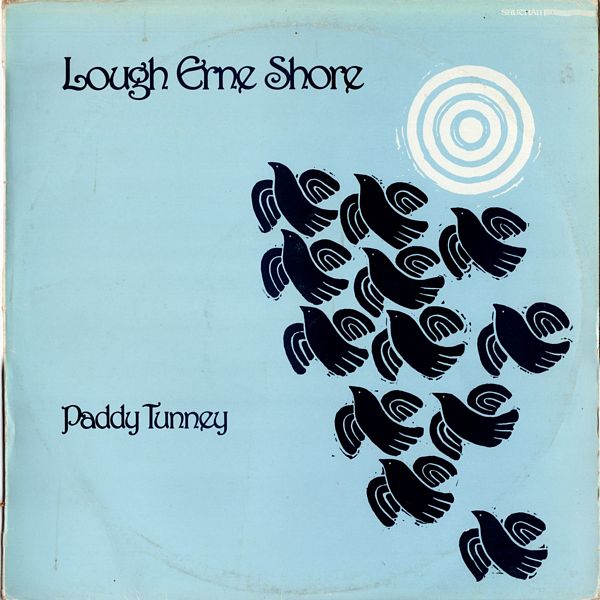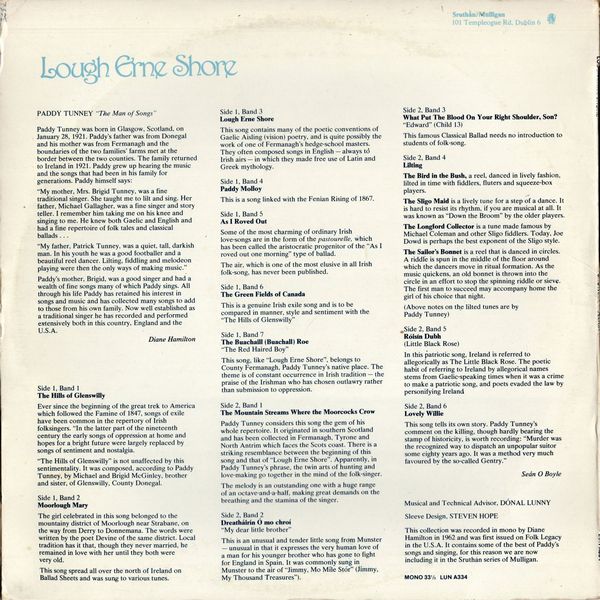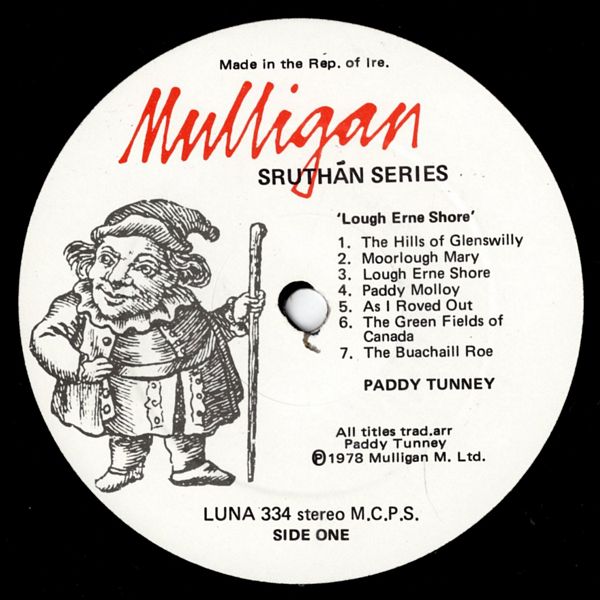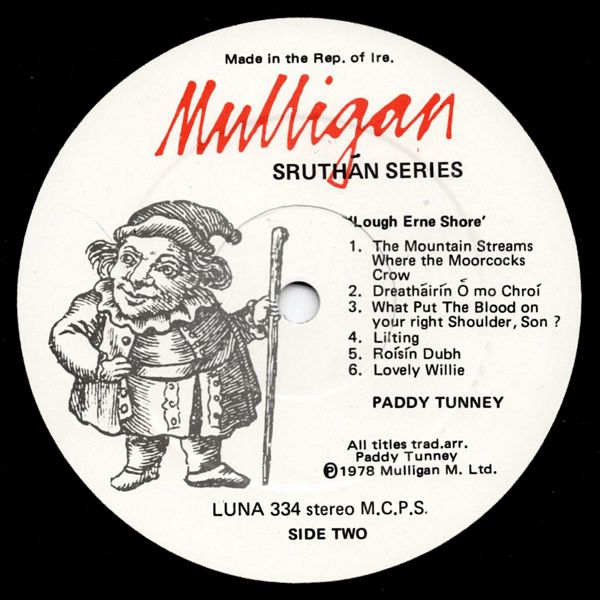
 |



|
PADDY TUNNEY "The Man of Songs"
Paddy Tunney was born in Glasgow, Scotland, on . January 28, 1921. Paddy's father was from Donegal and his mother was from Fermanagh and the boundaries of the two families' farms met at the border between the two counties. The family returned to Ireland in 1921. Paddy grew up hearing the music and the songs that had been in his family for generations. Paddy himself says:
"My mother, Mrs. Brigid Tunney, was a fine traditional singer. She taught me to lilt and sing. Her father, Michael Gallagher, was a fine singer and story teller. I remember him taking me on his knee and singing to me. He knew both Gaelic and English and had a fine repertoire of folk tales and classical ballads …
"My father, Patrick Tunney, was a quiet, tall, darkish man. In his youth he was a good footballer and a beautiful reel dancer. Lilting, fiddling and melodeon playing were then the only ways of making music."
Paddy's mother, Brigid, was a good singer and had a wealth of fine songs many of which Paddy sings. All through his life Paddy has retained his interest in songs and music and has collected many songs to add to those from his own family. Now well established as a traditional singer, he has recorded and performed extensively both in this country, England and the U.S.A.
Diane Hamilton
The Hills of Glenswilly
Ever since the beginning of the great trek to America which followed the Famine of 1847, songs of exile have been common in the repertory of Irish folksingers. "In the latter part of the nineteenth century the early songs of oppression at home and hopes for a bright future were largely replaced by songs of sentiment and nostalgia.
"The Hills of Glenswilly" is not unaffected by this sentimentality. It was composed, according to Paddy Tunney, by Michael and Brigid McGinley, brother and sister, of Glenswilly, County Donegal.
Moorlough Mary
The girl celebrated in this song belonged to the mountainy district of Moorlough near Strabane, on the way from Derry to Donnemana. The words were written by the poet Devine of the same district. Local tradition has it that, though they never married, he remained in love with her until they both were very old.
This song spread all over the north of Ireland on Ballad Sheets and was sung to various tunes.
Lough Erne Shore
This song contains many of the poetic conventions of Gaelic Aisling (vision) poetry, and is quite possibly the work of one of Fermanagh's hedge-school masters. They often composed songs in English —always to Irish airs —in which they made free use of Latin and Greek mythology.
Paddy Molloy
This is a song linked with the Fenian Rising of 1867.
As I Roved Out
Some of the most charming of ordinary Irish love-songs are in the form of the pastourelle, which has been called the aristocratic progenitor of the "As I roved out one morning" type of ballad.
The air, which is one of the most elusive in all Irish folk-song. has never been published.
The Green Fields of Canada
This is a genuine Irish exile song and is to be compared in manner, style and sentiment with the "The Hills of Glenswilly".
The Buachaill (Buachall) Roe — "The Red Haired Boy"
This song. like "Lough Erne Shore", belongs to County Fermanagh, Paddy Tunney's native place. The theme is of constant occurrence in Irish tradition —the praise of the Irishman who has chosen outlawry rather than submission to oppression.
The Mountain Streams Where the Moorcocks Crow
Paddy Tunney considers this song the gem of his whole repertoire. It originated in southern Scotland and has been collected in Fermanagh, Tyrone and North Antrim which faces the Scots coast. There is a striking resemblance between the beginning of this song and that of "Lough Erne Shore". Apparently, in Paddy Tunney's phrase, the twin arts of hunting and love-making go together in the mind of the folk-singer. The melody is an outstanding one with a huge range of an octave-and-a-half, making great demands on the breathing and the stamina of the singer.
Dreatháirín Ó mo Chroí
— "My dear little brother"
This is an unusual and tender little song from Munster —unusual in that it expresses the very human love of a man for his younger brother who has gone to fight for England in Spain. It was commonly sung in Munster to the air of "Jimmy, Mo Míle Stór" ("Jimmy, My Thousand Treasures").
What Put The Blood On Your Right Shoulder, Son?
— "Edward" (Child 13)
This famous Classical Ballad needs no introduction to students of folk-song.
Lilting
The Bird in the Bush, a reel, danced in lively fashion, lilted in time with fiddlers, fluters and squeeze-box players.
The Sligo Maid is a lively tune for a step of a dance. It is hard to resist its rhythm, if you are musical at all. It was known as "Down the Broom" by the older players.
The Longford Collector is a tune made famous by Michael Coleman and other Sligo fiddlers. Today, Joe Dowd is perhaps the best exponent of the Sligo style.
The Sailor's Bonnet is a reel that is danced in circles. A riddle is spun in the middle of the floor around which the dancers move in ritual formation. As the music quickens, an old bonnet is thrown into the circle in an effort to stop the spinning riddle or sieve. The first man to succeed may accompany home the girl of his choice that night.
(Above notes on the lilted tunes are by Paddy Tunney)
Roisin Dubh (Little Black Rose)
In this Patriotic song, Ireland is referred to allegorically as The Little Black Rose. The poetic habit of referring to Ireland by allegorical names stems from Gaelic-speaking times when it was a crime to make a patriotic song, and poets evaded the law by personifying Ireland.
Lovely Willie
This song tells its own story. Paddy Tunney's comment on the killing, though hardly bearing the stamp of historicity, is worth recording: "Murder was the recognized way to dispatch an unpopular suitor some eighty years ago. It was a method very much favoured by the so-called Gentry."
Seán O Boyle